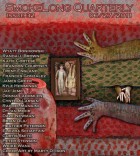Can you tell us a bit about the origin of this story?
The jars were the first thing I saw when I began writing this story, they just stood out really clearly: all shapes and sizes with the remnants of food labels still sticking to their outsides, and on the insides various body parts suspended in some kind of green, viscous, preserving fluid. It would be a familiar image in a high school bio lab, maybe, but really out of place in a teenage girl’s bedroom. Something about that contrast intrigued me. I also liked the freedom of the alternate universe the jars — and their uses — opened up for me. Anything could happen in that world, but the characters still feel themselves to be defined by their physical limitations. Diane is overweight and her sister is underweight, but both of them feel trapped in their bodies, they just deal with that feeling in different ways.
What do you think will become of Jenny and Diana? Will they overcome their physical limitations? Or be destroyed by them?
I’m not sure how everything will end up for them, but I do think neither of them are at rock bottom at the story’s end. Instead, I think the end of the story is when Diana begins to transition from jealousy to concern over her sister’s condition, and Jenny keeps herself from expressing the concern she feels for Diana by trying to detach from everything and everyone around her. Keeping this piece short really forced the characters to begin to reexamine themselves and their desires in relation to others, but there’s no room for a final resolution. I do think both of them will struggle with their separate and similar problems for most of their lives. Being a terminally optimistic person myself, I hope that they overcome their conditions, but it’s beyond the scope of the story.
What attracts you to flash fiction as a form of story-telling?
I like writing short short stories for the same reason I like reading them, which is for the jolt of felt experience they convey. You sort of get to dip your toe into the pool of someone’s life and be moved by whatever emotional current they’re subject to at the moment you encounter them. It’s hard to get away from the metaphor of electricity. A really powerful short short can hit a reader like a bolt of lightning from a blue sky, or a joy-buzzer in a stranger’s handshake. Their brevity allows for all kinds of experimentation, too, in terms of genre and subject, so writers can play with scenarios that might not stand up to scrutiny in a longer work. And as a form, short shorts are an example of how constraints on writing often engender great creativity, which is something poets have known for centuries.
What is your writing process like?
I think of writing in terms of sculpting. I try to push a lump of clay into the shape of a giraffe and then show it to a reader I trust who says, “Oh, is that the Eiffel Tower?” and then I work on crafting a longer neck and more defined ears, add knee joints and hooves and a tail, and try to layer on the spots until it’s as close as that piece is going to come to the vision of it I have in my head. Basically, my process is almost all revision-based. I think that’s why I’ve found it so challenging to work on the novel I’m writing now; I know I’m making so many mistakes on the first pass, but I can’t pause to fix them all until I have the whole messy manuscript in front of me. Short stories are more enjoyable because once I have a draft, I can play with different openings and endings, refine character, compress scenes, tinker with the sentence-level language, and have a draft I’m happy with relatively soon. I guess short shorts are the most satisfying kind of fiction for me because I can draft them quickly and then it’s more about cutting things down and pulling the language tight than rearranging them. Once I get to the point of revising anything though, my process is very similar. I read the piece out loud and try to listen for the snags of voice or language, and cut-cut-cut until I’ve fit everything essential into as small a space as possible.
Could you share a few words of advice for aspiring writers?
This is a hard question since I still consider myself an aspiring writer, but I’ll pass on some advice that others have given me that I still go back to all the time. First, writers are people who write. It seems hit-yourself-on-the-forehead obvious, but I find it really important to remind myself that putting in the hours in front of a laptop or notebook is what makes a writer, not accumulating publications or awards or honors, which are always, on some level, subjective. Secondly, and similarly, persistence is probably the most commonly held attribute of all successful writers, not raw, naked talent. This is why it’s helpful to build up a tolerance to rejection (which is generally just as subjective as success), but to also gather a handful of good readers and allow their criticism to inform your work. Finally, read everything you can get your hands on. There’s no better food for writing.



 The SmokeLong Grand Micro Contest (The Mikey) is now an annual competition celebrating and compensating the best micro fiction and nonfiction online.
The SmokeLong Grand Micro Contest (The Mikey) is now an annual competition celebrating and compensating the best micro fiction and nonfiction online.